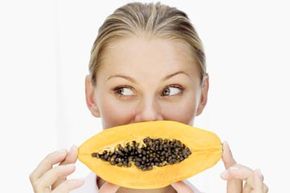As far as skincare goes, new trends pop up all the time. But one recent trend could have implications for better health for the entire body, including its largest organ, the skin.
A crop of local farmers' markets has increased as of late, and with it comes access to wholesome fruits and vegetables. And some of the same fruit you may enjoy eating with breakfast or for a healthy snack could have added benefits for your skin.
Advertisement
So why spend a lot of money on products when you can brighten, tighten and reduce wrinkly skin the easy way? The following are five fruits that aren't just good for the body, they're excellent for healthy skin, too.
• Papaya: This tropical fruit is known to have properties that help firm up skin and prevent sagging. Papaya has beta-carotene, vitamin C, flavonoids, folate, potassium and magnesium. Of the fruits on this list, all have some amount of vitamin C, but papaya is considered an excellent source. This vitamin is essential to the body's production of collagen, a protein that gives skin its firmness [source: Natural Food Hub].
• Avocado: Because they're more savory than sweet, avocados are often confused as a vegetable. But these green orbs are actually a fruit, one of a tropical nature like papaya. The key to an avocado's benefit to skin cells are the high levels of monounsaturated fat, considered a "good" fat. Monounsaturated fats help moisturize skin and replace oil that gets removed when washing [source: WebMD].
• Strawberry: Next on the list is one of spring and summer's most sought-after treasures, strawberries. Known for their sweetness, strawberries are a great addition to a bowl of whole grain cereal. But hiding behind that sweetness is a host of health-boosting vitamins and minerals. In addition to high concentrations of vitamin C, strawberries are rich in antioxidants, compounds that help neutralize free radicals in the body. Free radicals are broken down molecules that can cause damage to cells, including skin cells [source: International Food Information Council]. In one study of 12 popular fruits, strawberries ranked the highest in antioxidant content, more than grapes, apples or tomatoes [source: Wang].
• Plum: Another sweet fruit that's good for your skin is the plum. In the same study on antioxidants, plums were just behind strawberries in the amount of antioxidants per serving [source: Wang]. And plums, like many other fruits, are a great source of dietary fiber. Fiber is important in ridding the body of harmful toxins by "escorting" them through the digestive tract [source: Tufts University]. One helpful tip to remember in choosing fruits high in antioxidants is to look for deep purple and red hues, like those in plums, strawberries and other berries [source: International Food Information Council].
• Pear: The final fruit on our list comes in a number of shapes and sizes. Sweet treat on their own, pears are also great in a number of recipes. They also happen to be a fantastic source of fiber. Of common fruits, pears provide the greatest amount of fiber. One large pear has 5 grams of fiber, three of which are soluble fiber [source: Tufts University]. Soluble fiber helps rid the body of toxins that damage skin cells.
To learn more about the benefits of fruit for your skin, click on the links on the next page.
Advertisement
